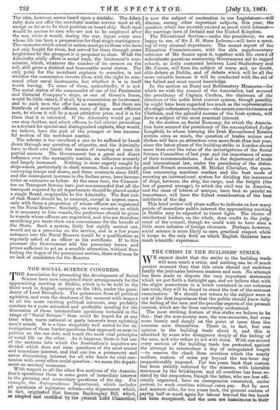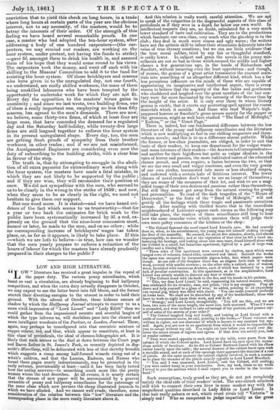THE CRISIS IN THE BUILDERS' STRTICE cannot doubt that the
strike in the building trade will soon reach a crisis, and nothing can be of much greater moment than that this crisis should not embitter fatally the jealousies between masters and men. No attempt has been made to dispute the very important statement which we put forth a fortnight ago, and we believe that with the slight corrections in a letter contained in our columns last week, they will be found to stand the test of the severest examination. We should not return to the subject were it not of the first importance that the public should know fully the feeling of the men and the peculiar aspects of the present contest, which are far from universally understood.
The most striking feature of this strike we believe to be this : that the non-society men, the non-unionists, feel even more keenly and deeply on the point at issue than the unionist men themselves. There is, in fact, but one opinion in the building trade about it, and this is admitted by some who disapprove deeply of the feeling of the men, and who refuse to act with them. With one accord every section of' the building trade has protested against the attempt to reintroduce a day of unregulated length —to remove the check from overtime which the nearly uniform custom of extra pay beyond the ten-hour day unquestionably imposed. For ten years back that custom has been strictly enforced by the masons, with tolerable strictness by the bricklayers, and all overtime has been re- sisted by the carpenters, though the latter, who are less effi- ciently organized, have on emergencies consented? under protest, to work overtime without extra pay. But by men and masters alike, for ten years back, the general custom of paying half as much again for labour beyond the ten hours has been tecogniad; and the men are unanintous in their conviction that to yield this check on long hours, in a trade where long hours at certain parts of the year are the obvious interest, not to say necessity, of the masters, would be to betray the interests of their order. Of the strength of this feeling we have heard several remarkable proofs. In one case, a master who had adopted the ten-hour system, after addressing a body of one hundred carpenters—(the car- penters, we may remind our readers, are working on the hour system, under protest, not having the funds to strike) —gave 5/. amongst them to drink his health in, and assured them of his hope that they would come round to his views. The carpenters took the money, and went off each with his shilling to the Masons' Committee to add it to the fund for resisting the hour system. Of those bricklayers and masons who have given in to the unregulated day, not one fourth, we understand, are really skilled workmen, the mass of them being unskilled labourers who have been tempted by the opportunity to undertake work for which they are not fit. Every day the opposition to the masters' terms gains in unanimity ; and since we last wrote, two building firms, one of them a really important one, employing no less than fifty masons, has agreed to the men's demands. There are now, we believe, some thirty-two firms, of which at least four are large ones, that have conceded the demand for a regulated day and the Saturday half-holiday, while twenty-five large firms are still leagued together to enforce the hour system in its present unregulated shape. Every day, too, the men are getting fresh proofs of sympathy from their brother workmen in other trades ; and if we are not misinformed, the Amalgamated Engineers are considering even now the duty of subscribing to the building strike, with a clear bias in favour of the step.
The truth is, that by attempting to smuggle in the aboli- tion of all extra payment for extraordinary work along with the hour system, the masters have made a fatal mistake, in which they are not likely to be supported by the public ; and if they are wise, they will reconsider their position at once.. We did not sympathize with the men, who seemed to us to be clearly in the wrong in the strike of 1859 ; and now, when they seem to be as clearly in the right, we need not hesitate to give them our support. •
But one word more. It is stated—and we have heard evi- dence of the fact which seems to us trustworthy—that for a year or two back the estimates for brick work to the public have been systematically increased by 31. a rod, ex- pressly on the ground that the nine-hour concession must, sooner or later, be made to the men, and on no other ; while no corresponding increase of bricklayers' wages has taken place, or, as far as it appears, is likely to take place. If this —which we are loth to believe—is true, how can we wonder that the men yearly prepare to enforce a reduction of the hours of labour for which the masters have already prudently prepared in their charges to the public ?































 Previous page
Previous page